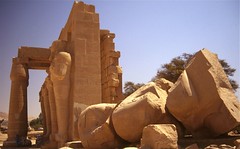
The frequency of postings having gone down a bit, the readers may be wondering what I am up to. I am preparing for the first anniversary of this blog.
Today I want to share with you a second poem that has persisted in my memory since school days – the first one having been Twenty Froggies. The name is Ozymandias and was written by Percy Bysshe Shelley in a competition with Horace Smith. The poem is below:
I met a traveller from an antique land,
Who said — “two vast and trunkless legs of stone
Stand in the desert … near them, on the sand,
Half sunk a shattered visage lies, whose frown,
And wrinkled lips, and sneer of cold command,
Tell that its sculptor well those passions read
Which yet survive, stamped on these lifeless things,
The hand that mocked them, and the heart that fed;
And on the pedestal these words appear:
My name is Ozymandias, King of Kings,
Look on my Works ye Mighty, and despair!
Nothing beside remains. Round the decay
Of that colossal Wreck, boundless and bare
The lone and level sands stretch far away.”
The competing entry was (and this one is also nice, but presents a slightly different field of view):
In Egypt’s sandy silence, all alone,
Stands a gigantic Leg, which far off throws
The only shadow that the Desart knows: —
“I am great OZYMANDIAS,” saith the stone,
“The King of Kings; this mighty City shows
“The wonders of my hand.” — The City’s gone, —
Nought but the Leg remaining to disclose
The site of this forgotten Babylon.We wonder, — and some Hunter may express
Wonder like ours, when thro’ the wilderness
Where London stood, holding the Wolf in chace,
He meets some fragments huge, and stops to guess
What powerful but unrecorded race
Once dwelt in that annihilated place.
The message the both convey is simple: Time is bigger than any and all of us. For the believers, it also means that God mocks your pride.


Yes, it is true. Late in 1817, Shelley and his friend Horace Smith did decide to have a sonnet competition and the subject of their sonnets was a partially-destroyed statue of Ramses that was making its way to London from Egypt. Shelley, it seems was fascinated by the statue and his poem was published first in The Examiner in 1818. Smith’s version was published a month later but was titled “On A Stupendous Leg of Granite, Discovered Standing by Itself in the Deserts of Egypt, with the Inscription Inserted Below.” For more facts and trivia on Ozymandias, check out Shmoop.